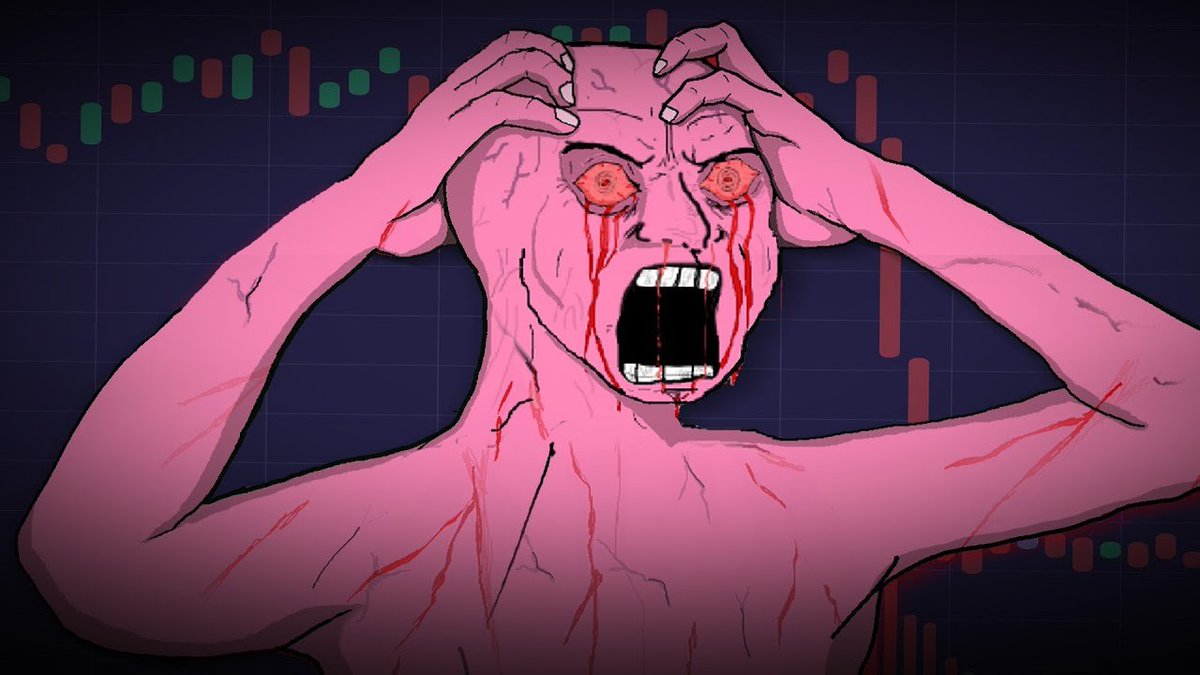
Why most of your tech startup investments are bad and won't make it through the bear market.
- Thread Time 🧵-
#axotrade #cardano #cardanocommunity #ada $ada #defi
- Thread Time 🧵-
#axotrade #cardano #cardanocommunity #ada $ada #defi

1/ Intro
A core tenet of traditional financial education is that when you invest, it should be done in businesses that can support their own existence. This has changed in recent decades.
Now, it's about numbers going up at ever higher rates instead of sound fundamentals...
A core tenet of traditional financial education is that when you invest, it should be done in businesses that can support their own existence. This has changed in recent decades.
Now, it's about numbers going up at ever higher rates instead of sound fundamentals...

2/ Tech Boom
The problem stems from the 90s tech bubble. All of a sudden you had hyper scalable tech, and it was difficult to value, as the same infrastructure could service a million or a billion users.
Growth, not profitability, became the prime focus.
The problem stems from the 90s tech bubble. All of a sudden you had hyper scalable tech, and it was difficult to value, as the same infrastructure could service a million or a billion users.
Growth, not profitability, became the prime focus.

3/ No Dividends
Amazon popularized the growth mindset, where profitability is spurned in favor of growth.
Then, when the 2000s dot-com crash happened, they were one of the few left standing, and became the standard to follow into the future
From their 1997 Annual Returns:
Amazon popularized the growth mindset, where profitability is spurned in favor of growth.
Then, when the 2000s dot-com crash happened, they were one of the few left standing, and became the standard to follow into the future
From their 1997 Annual Returns:

4/ Hindsight
Amazon was one of the most extraordinary investments ever. Had you invested a single dollar after the dot-com crash, you could have made $185 within two decades.
That's why it became the model for tech firms to follow, it became known as "Blitzscaling".
Amazon was one of the most extraordinary investments ever. Had you invested a single dollar after the dot-com crash, you could have made $185 within two decades.
That's why it became the model for tech firms to follow, it became known as "Blitzscaling".

5/ Blitzscaling
This new way of doing business, of losing money while scaling to your target audience and only then trying to find a way of making your business profitable, is reliant on the goodwill of investors with infinitely deep pockets - this is due to "cheap money".
This new way of doing business, of losing money while scaling to your target audience and only then trying to find a way of making your business profitable, is reliant on the goodwill of investors with infinitely deep pockets - this is due to "cheap money".

6/ Quantitive Easing
In 2008, due to a collapse of the world economy, many developed nations began printing money - AND LOTS OF IT - which was then used to bail out markets and push down the cost of interest rates.
Rates went down so much that rich people were PAID to BORROW $.
In 2008, due to a collapse of the world economy, many developed nations began printing money - AND LOTS OF IT - which was then used to bail out markets and push down the cost of interest rates.
Rates went down so much that rich people were PAID to BORROW $.

7/ Rich Investors
The problem with having a lot of money is that eventually you run out of places to put it in. After all, there are only so many billions you can put into Google before valuations look ridiculous, so investors started looking elsewhere and with little prejudice.
The problem with having a lot of money is that eventually you run out of places to put it in. After all, there are only so many billions you can put into Google before valuations look ridiculous, so investors started looking elsewhere and with little prejudice.

8/ Silicon Valley
This cheap money, euphemistically called "helicopter money", was used to invest in projects that had a low chance of success, but high reward potential
Investors would place "small" bets on thousands of these companies. So if one succeeded it paid for the rest
This cheap money, euphemistically called "helicopter money", was used to invest in projects that had a low chance of success, but high reward potential
Investors would place "small" bets on thousands of these companies. So if one succeeded it paid for the rest

9/ Growth Beyond Sense
With this seemingly infinite supply of money, and a mandate to grow at all costs, startups started doing silly things - they began designing business models where they would lose money with each client that they got, with no clear way towards profit.
With this seemingly infinite supply of money, and a mandate to grow at all costs, startups started doing silly things - they began designing business models where they would lose money with each client that they got, with no clear way towards profit.

10/ Accidental Ponzis
Given no clear path to making money and reliance on ever increasing piles of cash to survive, these investments started adopting Ponziesque traits. Price/Earnings ratio climbed, meaning investors paid 100s of dollars per $ of revenue - this is unsustainable
Given no clear path to making money and reliance on ever increasing piles of cash to survive, these investments started adopting Ponziesque traits. Price/Earnings ratio climbed, meaning investors paid 100s of dollars per $ of revenue - this is unsustainable

11/ Startup Culture
These companies know they have to show a high level of growth, so it's normal for startups to spend over 50% of their investor funds on marketing and increasing their user base, as opposed to designing a workable product that can break even.
These companies know they have to show a high level of growth, so it's normal for startups to spend over 50% of their investor funds on marketing and increasing their user base, as opposed to designing a workable product that can break even.

12/ Capitalist Socialism
During the last decade of cheap money, many services that we use in our day-to-day lives have been made artificially cheap. The average Westerner has gotten used to cheap rides, free deliveries, etc., indirectly subsidized by investors with money to burn
During the last decade of cheap money, many services that we use in our day-to-day lives have been made artificially cheap. The average Westerner has gotten used to cheap rides, free deliveries, etc., indirectly subsidized by investors with money to burn

13/ A Large Part of the Economy
If we look at the S&P 500 (a list of the 500 biggest companies in the US stock market) the top 5 are tech companies and account for over 20% of the list. Startups similarly comprise a dynamic portion of the global economy.
If we look at the S&P 500 (a list of the 500 biggest companies in the US stock market) the top 5 are tech companies and account for over 20% of the list. Startups similarly comprise a dynamic portion of the global economy.

14/ Lots of Dependents
So influential are these tech companies & their way of doing things that there are entire financial ecosystems built around them. There are armies of cleaners, consultants, accountants, lawyers, etc. - they aren't in the tech sector but are dependent on it
So influential are these tech companies & their way of doing things that there are entire financial ecosystems built around them. There are armies of cleaners, consultants, accountants, lawyers, etc. - they aren't in the tech sector but are dependent on it

15/ Party's Over
The problem now is that inflation has been ruining people's livelihoods, and the status quo of cheap money has come to a rapid end. Interest rates are spiking and with them, investor patience for perpetually unprofitable startups is evaporating.
The problem now is that inflation has been ruining people's livelihoods, and the status quo of cheap money has come to a rapid end. Interest rates are spiking and with them, investor patience for perpetually unprofitable startups is evaporating.
16/ Memento Mori
Investors don't need to try to kill tech startups for them to die, they're so fragile that if they don't get a steady stream of investor cash, they die as they don't have any profit
Then it might just be a domino effect of startups and their dependents.
Investors don't need to try to kill tech startups for them to die, they're so fragile that if they don't get a steady stream of investor cash, they die as they don't have any profit
Then it might just be a domino effect of startups and their dependents.
17/ Adapt or Die
Bear markets are often the grounds for unicorns, billion-dollar companies, to be born. This happens because, in their effort to survive, they end up having to change to suit the new landscape.
Bear markets are often the grounds for unicorns, billion-dollar companies, to be born. This happens because, in their effort to survive, they end up having to change to suit the new landscape.

18/ End of Blitzscaling?
Now that the business model of essentially paying people to become your customers is no longer workable, what comes after?
Blitzscaling makes sense in some ventures, but in most others, businesses will have to scale back and become sustainable.
Now that the business model of essentially paying people to become your customers is no longer workable, what comes after?
Blitzscaling makes sense in some ventures, but in most others, businesses will have to scale back and become sustainable.

19/ Blitzscaling & Crypto
Given that blockchain is Silicon Valley adjacent, it has picked up many of the bad habits of its older brother. Over the coming years, utility and not hype will determine the success and viability of projects.
Given that blockchain is Silicon Valley adjacent, it has picked up many of the bad habits of its older brother. Over the coming years, utility and not hype will determine the success and viability of projects.

20/ Conclusion
Every era has a dominant business model likely to allow companies to get funding and thrive. The era of low interest rates prioritized breadth over depth.
The winds are changing, reality is reasserting itself, and the businesses which recognize this will thrive.
Every era has a dominant business model likely to allow companies to get funding and thrive. The era of low interest rates prioritized breadth over depth.
The winds are changing, reality is reasserting itself, and the businesses which recognize this will thrive.

If you enjoyed this thread, please like, retweet the first post, and subscribe to @axotrade 🧵
For something more in-depth, make sure to check out our ongoing History of Finance series:
axo.trade/newsroom/posts…
For something more in-depth, make sure to check out our ongoing History of Finance series:
axo.trade/newsroom/posts…
• • •
Missing some Tweet in this thread? You can try to
force a refresh












